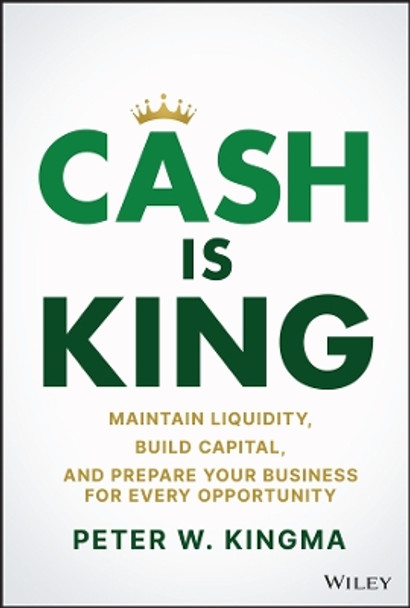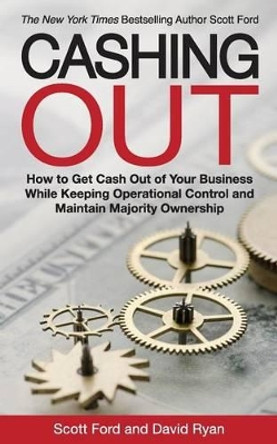Description
An illuminating exploration of the importance of your company's cash position and the steps you can take to ensure organizational liquidity
In Cash is King, working capital and cash strategist Peter W. Kingma delivers an insightful and practical discussion of why your company's cash position should be on an equal footing with sales, cost, and service, and how to make that happen. You'll learn why cash is the fuel in your corporate engine and discover the attributes of an organizational cash culture and how to adopt them within your own firm.
While explaining some of the most important-and most misunderstood-corporate finance concepts, this book is not a finance textbook. Instead, it uses case study examples to offer concrete suggestions for improvements in your company that increase the availability of cash when you most need it. You'll also find:
- Discussions of the importance of sufficient liquidity for operational concerns, research and development, and capital improvements
- Explorations of the consequences of insufficient cash positions
- Examinations of the ripple effects of seemingly small decisions that affect cash supply
An essential resource for managers, executives, and business leaders everywhere, Cash is King is an effective and hands-on exploration of cash as the lifeblood of any modern commercial entity and an incisive guide to ensuring that your company will have enough of it when its required.
About the Author
PETER W. KINGMA has over thirty years' experience advising some of the largest and most recognizable corporations in the world on their financial positions. He is an expert in helping firms increase cash on hand from operations and the effective use of capital. He is a strategy and transactions principal at EY Parthenon, leading the working capital practice in the Americas.
Reviews
A comprehensive overview of all aspects of finance and cash management in business.
Kingma, a financial expert, acknowledges the long shadow cast by the Covid-19 pandemic, which not only shut down many of the world's economies but also highlighted how elongated and interconnected the global supply chain has become. Kingma acknowledges that businesses deal with many complicated factors, like supply-chain issues, product design and advertising, market competition, interest rates, and so on, but from his experience and research, he derives a very simple truth: "It takes cash to address market shocks." This simple truth has a vast and complicated network of realities underpinning it, and the author explores this by means of an ongoing fictional device: an electrical equipment company called Owens Electrical, run by a man named Bob. Owens does mostly business-to-business commerce, and since Bob rose through the company's ranks to become its CEO, his perspective gives Kingma the perfect vehicle to explain the intricacies of cash management in a successful company that does all of that managing in-house. The author goes over every aspect of order-to-cash (OTC) mechanics: gaining customers, taking their orders, invoicing and billing them, and receiving their cash in the bank. Along the way, Kingma dispenses a great deal of technical advice on all levels of finance, usually revolving around Days Sales Outstanding (DSO), or the number of days on average required to collect money from a particular customer.
The author's experience is obvious on every page. His ability to get to the heart of the many complicated subjects he raises is exemplary, as is his skill at dissecting those subjects in ways that will be immediately accessible to non-specialists (up to a point, anyway; the book clearly targets those in the business/finance world). Document, document, document, he advises: "Be very clear in how you manage credit and risk so that any deviation can be seen and approved in the proper chain of command." He reminds readers who may be overly inclined to delegate and compartmentalize responsibilities that, much like those over-stressed supply chains, everything is connected. Kingma is an invaluable guide to his subject, but the biggest and most pleasing surprise of his book is the fact that he's also a decent writer of fiction. His hypothetical company of Owens Electrical convincingly grows and becomes more complicated as it faces each new issue he wants to illustrate. Sometimes, his characters sound like business seminar transcripts instead of people: "We had to challenge our assumptions regarding talent and whom we needed in key roles," says one android to another. "We modified our metrics and incentives and transformed operations reviews." But most of the time, readers will find themselves at least as involved with the narrative as with the concepts. They'll cheer on Makayla, a surgeon raised by an immigrant mother in rural Missouri; they'll appreciate the fact that visionary Caesar likes to have new hires around him, to guard against the complacent thinking of the old guard; and they'll be just as surprised as Annette's co-workers when the steely, no-nonsense woman unexpectedly cracks a joke. Readers will come for the financial know-how, but some of them may very well stay in order to root for a company that isn't even real.
A thoroughly informative-and surprisingly gripping-manual for clear-eyed money management.
-KIRKUS REVIEWS
Book Information
ISBN 9781119983354
Author Peter W. Kingma
Format Hardback
Page Count 208
Imprint John Wiley & Sons Inc
Publisher John Wiley & Sons Inc
Weight(grams) 408g
Dimensions(mm) 231mm * 160mm * 25mm







